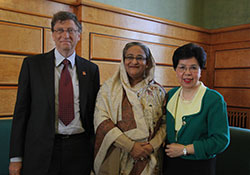Opening of World Health Assembly: Director-General urges ministers to “remember the people”

WHO/Pierre Albouy
The Sixty-fourth World Health Assembly, WHO’s annual global meeting for ministers and senior health officials, opened yesterday.
In her opening address, Dr Margaret Chan, WHO Director-General, highlighted unprecedented progress, including deaths of children aged under 5 being at their lowest in more than 60 years, and a 60% drop in maternal mortality in two regions. She commended United Nations agencies, countries and public and private partners for their hard work in saving lives from preventable and treatable diseases in the face of current challenges, such as the global financial crisis and skyrocketing food and fuel prices. Urging her colleagues to keep up their momentum, Dr Chan said, “Any form of complacency at this point would be deadly.” She also announced that WHO is embarking on the most extensive administrative, managerial, and financial reforms in its sixty-three-year history.
Highlights for the European Region
- Dr Christos Patsalides, Minister of Health of Cyprus, was appointed President of the World Health Assembly.
- Hungary, the current President of the Council of the European Union, welcomed the increasing global focus on noncommunicable diseases (NCDs), and emphasized both WHO’s lead in this area, through its strategy and action plan, and the need for intersectoral action to be taken up at the United Nations high-level meeting on NCDs in September 2011, in its plenary address.
- Professor Ferruccio Fazio, Minister of Health of Italy, signed an agreement with Ms Zsuzsanna Jakab, WHO Director for Europe, on a three year-project on the public health aspects of migration.
- Delegates of European countries – including Finland, France, Greece,Norway, Portugal, the Russian Federation and the United Kingdom – spoke in plenary, pledging to support the Director General’s commitment to putting people first, and thanking the Russian Federation for hosting the First Global Ministerial Conference on Healthy Lifestyles and Noncommunicable Diseases Control in April this year. Several countries also thanked Ms Jakab for the positive direction of WHO/Europe’s work.
- Mr Andreas Loverdos, Minister of Health and Social Solidarity of Greece announced the forthcoming opening of a new WHO/Europe office in Athens, specializing in NCDs.
- A presentation by WHO/Europe on the work under way to develop Health 2020, a new public health policy for Europe, was warmly received by delegates.
- Delegates from Kazakhstan, Kyrgyzstan, the Republic of Moldova, the Russian Federation, Turkmenistan, Ukraine and Uzbekistan updated colleagues on their responses to the poliomyelitis outbreak in the Region. The European Regional Certification Commission for Poliomyelitis Eradication, will meet in August 2011 to discuss the European Region’s polio-free status.
- The draft European action plan on HIV/AIDS was presented to delegates. It will be submitted formally to Member States for adoption at the sixty-first session of the WHO Regional Committee for Europe in September 2011.
- Ms Jakab held productive meetings with delegations from Bosnia and Herzegovina, Israel, the Republic of Moldova and Slovenia .



